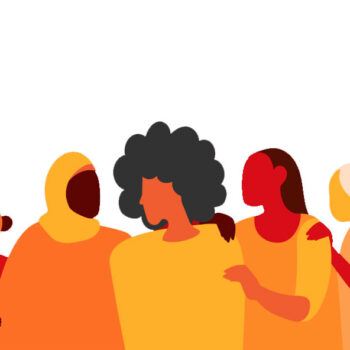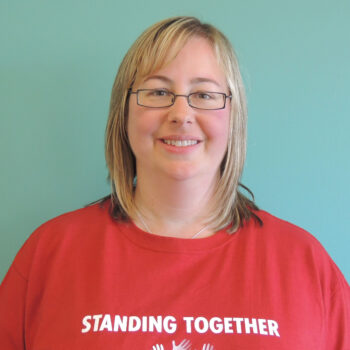The disproportionate effects of COVID-19 on women
The Disproportionate Effects of COVID-19 on Women
It has been less than a year since the global coronavirus pandemic spread across the world, but somehow it seems like it was a lifetime ago! The way we all live has completely changed, almost overnight. But as was reported in the recent issue of Catholic Teacher magazine, some groups have been hurt disproportionately.
A recent Statistics Canada report confirmed that COVID-19 has significantly impacted women on several fronts, including their finances, their health, and their safety. A UN Women report shows that women and girls are losing their employment at a greater rate than men because of the nature of the work they do. The Canadian Women’s Foundation echoes this finding by showing that more women than men have lost their jobs as a result of the pandemic, and women are returning to the workforce at a slower rate.
One reason for this, according to YWCA Canada, is that more women work in the occupations known as the 5Cs: caring, cashiering, catering, cleaning, and clerical. With the travel industry being devastated, restaurants shut down, stores experiencing less foot traffic, and employees working from home, the job losses in these areas have been profound. Women are also more likely to take time off work, including leaves without pay, to care for sick or quarantined children as well as aging parents. They are also typically more involved in supporting students’ learning from home, as well as juggling other domestic responsibilities. These traditional gender roles can lead to “time poverty” for women. Even more troubling is that in the absence of a financial need, this traditional family structure is still the preferred option for youth, according to a recent study published in Sociological Science.
Women’s health has also been disproportionately affected. In Ontario, the provincial government’s COVID-19 dashboard confirms that more women have tested positive and died from the coronavirus than men. According to the Centre for Addiction and Mental Health (CAMH), nearly 25 per cent of women have experienced moderate to severe anxiety, as well as increased feelings of loneliness or isolation since the start of the pandemic, compared to only about 18 per cent of men. Those rates are even higher (30 per cent) in women with children under the age of 18.
In addition to experiencing greater financial and health issues because of COVID-19, women have also been at greater risk in terms of their safety, in the face of rising incidents of violence and domestic abuse. In Canada, YWCA is reporting federal statistics showing a rise of 20 to 30 per cent in domestic violence rates. And one in five Indigenous women have been subjected to physical and psychological violence since the start of the pandemic. The uncertain economy, combined with self-isolation policies, is leading to more opportunities for abusers to increase women’s co-dependence on them, which in turn has also given them more opportunity for violence and manipulation.
Looking Ahead
It is clear that the pandemic has erased some of the gains women have made in recent years in terms of participation in the workforce, financial independence, gender roles, and health and safety. However, there are possible solutions and avenues to regain what has been lost, and improve the overall lives of women.
A crucial first step is to ensure that statistical data is disaggregated, so we can identify where, as well as how, racialized groups and women are being impacted. This information can then be used to inform policy change and institutional reform. Identifying and understanding who has been adversely affected is crucial for the development of effective responses that would bring about genuine change.
For women in particular, greater access to affordable childcare supports would allow them to seek out more full-time and stable work, creating more financial independence for themselves and their families. Also, within the workplace, since UN Women confirms that up to 70 per cent of health and social care workers are women, often working on the front lines, stronger health and safety measures are key to ensuring better working conditions and paramount to reducing COVID-19 infection rates among women.
Better wages, benefits, and full-time hours for those working in the care, catering, cashiering, cleaning, and clerical industries would also go a long way toward helping women gain financial independence. In terms of gender roles, while there is widespread acceptance of the fact that both men and women should equally participate in the workforce, that idea of equality does not extend to the unpaid work in the home. Women still take on most of the caretaking, meal preparation, and cleaning responsibilities. If we want to reduce women’s vulnerability in times of crisis, there must be increased recognition among partners of the necessity to share equally in all family/home responsibilities.
Finally, there needs to be a greater investment in mental health supports for all women, particularly those in racialized communities. It is imperative that more hotlines, shelters, awareness campaigns, and outreach programs be created or expanded if we want to reduce incidents of violence against women. Private industry has already had a positive effect on the development of new apps and other ways to connect women to organizations that help victims of violence and domestic abuse. The Ontario Domestic or Sexual Violence Leave is also providing some financial support as well as some time off for victims to seek medical attention, legal advice, counselling, or to move residence, while requiring that their employment remain secured.
The world is constantly changing, but it is not always evolving in positive ways. In times of crisis, such as this global pandemic, it may seem difficult to continue to be better and do better. This means having to challenge not only ourselves, but others, and the institutions which regulate our daily lives. The vulnerability women and racialized communities have experienced due to COVID-19 is a heavy burden, but with acknowledgement of the challenges, a shared commitment to change, and through our faith and interconnectedness, we can all help to bring the necessary resources to bear that will bring about positive change in the midst of so much pain and difficulty.
Julie Guévremont is a member of the Ottawa Unit and a member of the Status of Women Committee. The Committee is one of 17 provincial committees mandated in the OECTA Handbook. The focus of the committee is the elevation of the status of women both nationally and internationally. Click to review the committee’s terms of reference and membership.



